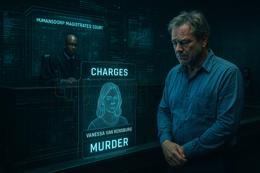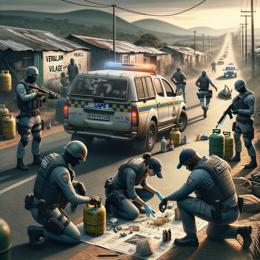Image created by AI
Joburg Residents Face Year-Long Battle with Power Outages in Wake of Substation Fire
The eastern suburbs of Johannesburg have been plunged into a state of hardship following a catastrophic fire at the Observatory substation in December. The fire, which decimated the control room and an essential 88KV oil cable, has resulted in ongoing power and water outages, exacerbating the strain from routine load-shedding.
The affected areas, including the wards of Yeoville, Bellevue, Bertrams, Upper Houghton, Kensington, Bezuidenhout Valley, Cyrildene, Dewetshof, Observatory, and Bruma, have experienced disruptions that lasted up to seven days in duration. The situation has fueled immense frustration among the residents, leading to service delivery protests and the submission of a significant petition demanding the cessation of load-shedding until the substation repairs are effectively completed.
Financial costs have been staggering, with residents reporting thousands of rands lost in spoiled groceries, while some businesses struggle to survive. Moreover, old age homes are unable to provide hot meals, and crime has surged as opportunistic criminals exploit the power outages, further destabilizing the community.
The City of Johannesburg has forecasted a bleak outlook, with expectations that these conditions could persist until the end of 2024. Amidst growing discontent, a large-scale protest is scheduled for February 24 at Rhodes Park in Kensington, signaling a community on the brink.
The grievances extend beyond just the outages themselves. Residents report a lack of engagement from city departments, no regular meetings to address the issues, and a failure to manage uncontrolled population growth and illegal businesses. This mismanagement, coupled with aging infrastructure unable to meet demand, has resulted in extensive and recurring electrical faults disrupting daily life.
The Democratic Alliance (DA), in response to the dire situation, has gathered over 2,000 signatures in a petition handed over to City Power officials. The petition calls for an immediate halt to load-shedding prior to completion of the substation repairs.
Although City Power officials suggest that the excessive power usage by residents has contributed to the problem, residents and activists, like Navin Bachu from Kensington and Abrar Cassim from Dewetshof, counter that this claim overlooks the broader issues, including the city's inability to address illegal connections, manage waste, and prevent vandalism.
Frustrations are echoed by DA ward councillor Carlos da Rochas, who has criticized City Power for what appears to be subpar repair work and inadequate long-term planning. He contends that stopping load-shedding while repairs are carried out is crucial for preventing further damage to ancient infrastructure and would expedite repair works, allowing technicians to work unhindered.
The City, however, has branded the DA's reaction as opportunistic, with the Member of the Mayoral Committee for Environment and Infrastructure, Jack Sekwaila, highlighting expedited efforts to restore power. Following the December fire, new interconnector cables over a 3-km stretch were installed, resulting in a relatively swift restoration of power to the affected substations.
Looking forward, Sekwaila notes that the city is undertaking a multidisciplinary approach to fully reinstate and repair the substations within the next year. In the interim, outage calls remain a high priority as the city grapples with resolving these underlying challenges.
As Johannesburg residents steel themselves for a prolonged battle with power outages, the impact of the Observatory substation fire continues to challenge the community's resilience, shining a light on broader inefficiencies requiring urgent attention.
#GOOGLE_AD










